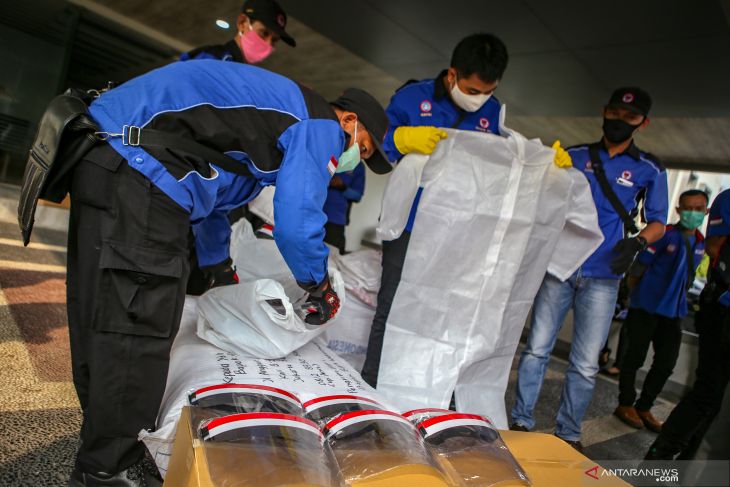I do think that community responses are very, very important and I think there is a lot to be encouragedJakarta (ANTARA) - This year, with communities across the globe battling the coronavirus pandemic, the International Labour Day is being commemorated differently.
Before the COVID-19 outbreak, Labour Day, which falls on May 1, would serve as an opportunity for workers to gather and celebrate their role in moving the economy. Many would come together to hold marches or rallies, and collectively voice their concerns to employers as well as the authorities.
But today, with the COVID-19 pandemic causing great economic distress in countries, especially the underdeveloped and developing nations, millions of workers worldwide are facing job losses.
The International Labour Organization (ILO) has reported that the COVID-19 crisis is expected to wipe out 6.7 percent of global working hours in the second quarter of 2020. The number is equivalent to 195 million full-time workers.
At the moment, there are 1.25 billion workers employed in sectors identified as being at high risk of ‘drastic and devastating’ increases in layoffs and reductions in salaries and working hours. The ILO reported earlier this week that 1.6 billion workers in the informal economy stand in immediate danger of losing their sources of income, and thus their livelihoods.
Whilst governments are preparing stimulus packages and measures to assist businesses and ensure workers are protected from job cuts, the ILO and communities across the world have called for urgent, targeted, and flexible measures to support workers as well as businesses.
Another important requirement is for the people themselves to come together and form a community response to these threats and express solidarity towards those who have been affected.
Community response has been one of the most interesting sociological phenomena in the response to the pandemic, said director general of the ILO, Guy Ryder, during a global press briefing, held virtually, in early April this year.
There has been a lot of the best coming out of community reactions, Ryder said, especially in support of the 170 million people working in the frontlines and in health and social services, who are putting in extraordinary effort to bring an end to the current pandemic and protect those who have been affected, and at the same time, keep the world of work moving.
“I do think that community responses are very, very important and I think there is a lot to be encouraged,” he noted.
To commemorate May Day this year, the Indonesian Workers Unions Confederation has taken steps to support medical and health sector workers. Even though workers across the nation are facing a potential drop in income, or even, loss of their source of income, the confederation distributed complete sets of personal protective equipment to fellow workers in the medical field — in hospitals and clinics.
The confederation’s president, Said Iqbal, also said on Thursday that it is conducting virtual campaigns on social media regarding three issues for this year’s labour day. They include calls for the rejection of the Omnibus Law, calls to stop lay-offs, and calls to let workers go home with full pay and incentives for the Eid holidays.

Solidarity in the community
The same solidarity and support can be directed towards those who are facing difficulties in their work. On various social media platforms, people are coming together to support each other during this trying time.
Social media can indeed be one of the most effective platforms to show support to each other. On Twitter, for example, user @larassatea is encouraging followers to help her friend sell flowers he gathered from florists in Jakarta’s Rawa Belong area and assist them through online sales.
“There are a lot of flower sellers who have lost their customers due to the pandemic as events are being cancelled as well,” she said. She completed her thread with videos and pictures showing the variants of flowers being sold, including lilies, chrysanthemums, and roses.Such community responses can be vital to ensure that employers are able to sustain their businesses, and in turn, do not need to lay off workers or cut their salaries, thereby ensuring their livelihoods.
There are several movements on Instagram, where users are promoting small businesses during their time at home. People with a large following are encouraging small businesses to send in their businesses’ profiles and promoting them among their followers. Others are spreading the word about their friend’s businesses.
These acts of solidarity are sustaining the economic activities of micro and small businesses, who may have family members that have been laid off or discharged from their workplace, and, at the same time, they are also supporting the income sources of informal workers, such as food delivery drivers.
As the worldwide crisis hits communities across the globe with no exceptions, the people have shown their ability to come together and support each other during a difficult and unprecedented time. Such solidarity can be the key to ensuring that those who are the most vulnerable and experiencing the most shocks from this pandemic are protected and taken care of so that no one is left behind.
Related news: Gauging whether pre-employment card is solution amid COVID-19 pandemic
Related news: Flexible work: The new normal after the pandemic ends?
Editor: Gusti Nur Cahya Aryani
Copyright © ANTARA 2020












